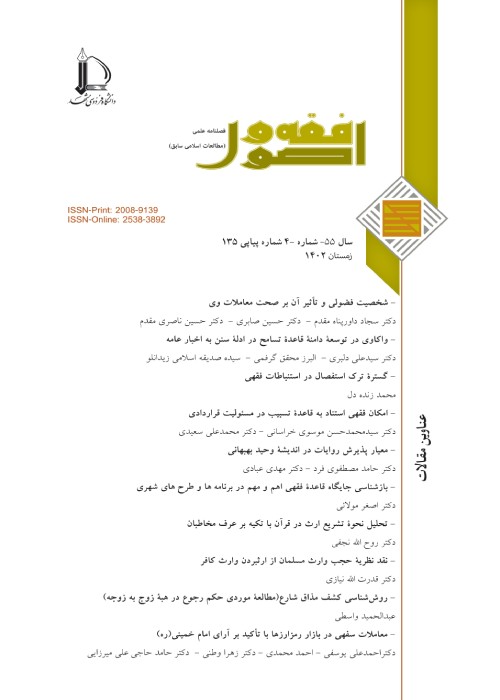The Capability of Religious Precepts to be Created and Its Impact on Analyzing the Jurisprudential Propositions
Author(s):
Article Type:
Research/Original Article (دارای رتبه معتبر)
Abstract:
Based on the four-stage theory, capability to be created is the first stage of a religious precept. Regardless of the possible existence of a precept capable of being created and different possibilities about its concept, the problem of this research is: what effects does the acceptance of the capability of religious precepts to be created, in the sense of the existence of benefits and harms, have on the analysis of religious teachings and whether some jurisprudential propositions may be excluded from the scope of deduction on the basis of it or in case of knowledge of actual benefits and harms, is it possible to establish a duty and attribute it to the Lawgiver, although it does not exist in the narrated teachings? The results of this research show that capability to be created belongs to the benefit and harm domain and is a preliminary of legislating a religious precept and is not one of its stages. Nevertheless, Imami jurists have utilized the term precept capable of being created in analyzing the religious precepts of different issues. The acceptance of a created precept that never transforms into the actuality stage does not seem to be justified. Since negligence in establishing a precept is not permissible for the Lawgiver and establishing a precept is based on the existence of benefit and harm resulted from the duty-bounds' acts, where the intellect can realize the existence of a benefit or harm for which the Lawgiver has not established an actual precept, due to the correlation between the precept of reason and the precept of religion, one may believe in the existence of a religious precept created for that act and the legitimacy or illegitimacy of its performance and the problem of the lack of religious precept for emerging issues would be resolved.
Keywords:
Language:
Persian
Published:
Islamic Jurisprudence & Its Principles, Volume:54 Issue: 130, 2022
Pages:
183 to 207
magiran.com/p2509064
دانلود و مطالعه متن این مقاله با یکی از روشهای زیر امکان پذیر است:
اشتراک شخصی
با عضویت و پرداخت آنلاین حق اشتراک یکساله به مبلغ 1,390,000ريال میتوانید 70 عنوان مطلب دانلود کنید!
اشتراک سازمانی
به کتابخانه دانشگاه یا محل کار خود پیشنهاد کنید تا اشتراک سازمانی این پایگاه را برای دسترسی نامحدود همه کاربران به متن مطالب تهیه نمایند!
توجه!
- حق عضویت دریافتی صرف حمایت از نشریات عضو و نگهداری، تکمیل و توسعه مگیران میشود.
- پرداخت حق اشتراک و دانلود مقالات اجازه بازنشر آن در سایر رسانههای چاپی و دیجیتال را به کاربر نمیدهد.
In order to view content subscription is required
Personal subscription
Subscribe magiran.com for 70 € euros via PayPal and download 70 articles during a year.
Organization subscription
Please contact us to subscribe your university or library for unlimited access!




